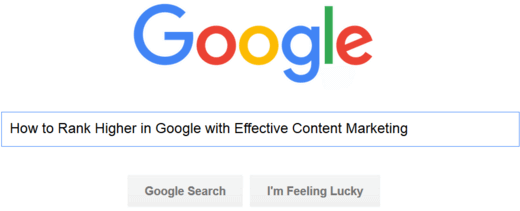It’s a tale as old as time: two lovers – always kept separate by those who think they know best – are actually perfectly suited to be together.
Yes, SEO and content marketing are actually that perfect couple.
Normally, the processes of improving SEO are applied separately to content marketing efforts, but I’ve found that in reality, there’s no better way to rank higher in search engines than to produce high quality content.
The internet loves good content, as it will naturally draw attention from the big, trusted sites, and an increase in traffic will naturally improve a site’s Google ranking.
Why SEO and Content Marketing Work Together
SEO is generally considered to be more technical than content marketing:
- It focuses on a specific, single purpose, and on working out which tweaks to a website will help it appeal to Google’s algorithms.
Good content provides many of the technical benefits that SEO requires, along with compelling material that draws the attention of site visitors.
All of these benefits are provided naturally by well-crafted content, without a lot of extra effort.
The benefits of good quality content on SEO are increasingly of interest to marketers:
- 51% of agencies polled by Econsultancy said that SEO was highly integrated into their content marketing strategy.
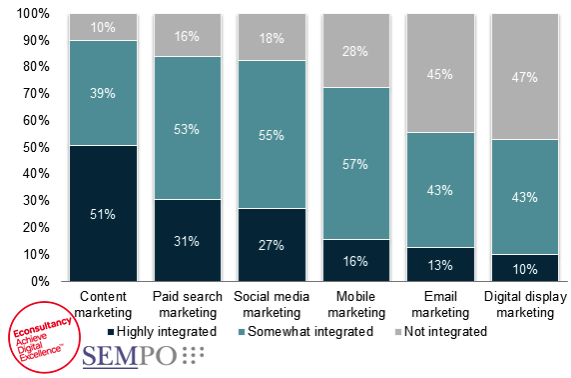
This is a huge amount of SEO concentration on content marketing, compared with relatively little focus on the next two most SEO-worthy fields according to agencies:
- Paid advertising.
- Social media marketing.
Let me put things simply: effective content marketing leads to a natural boost to search engine rankings.
For some more inspiration on creating content for SEO, this article from Brent Barnhart is a great read: How to Stop Worrying and Love Google’s Algorithms
How Good Content Can Appeal to Both Robots and Humans

SEO is generally thought of as the art of making websites appeal to search engines who are looking at specific metrics.
I think it’s important to remember, though, that these algorithms are specifically designed to find the most relevant information for human users.
This is particularly relevant as search engines get smarter, and focus more on human relevancy than on keywords.
There are a few simple techniques that you can utilize while designing your content that will help increase its SEO-friendliness.
Most of these techniques involve optimizing content for human readers, trusting that the computer algorithms within the search engines will be able to use them to spot a winner of a website.
Below are five useful content marketing focus points that can help grow your SEO visibility.
You’ll notice that the key to all of these pieces of advice isn’t to create content that appeals to search engines, but rather to create content that humans enjoy, which naturally build your SEO rankings as more users engage with your site and social media profiles.
1. Create Authoritative Content, Bring In Authoritative Links
Not all links are created equal.
Search engines consider some websites more valuable than others when it comes to deciding which search results should be ranked highest.
A website with tiny traffic or that hasn’t been updated in a long time doesn’t carry much weight when it offers a link to your website – Google tends to ignore sites that only have weak, untrustworthy links, both inbound and outbound.
Want to know if you’re looking at a weak site? Look up its domain authority (DA).
“Domain Authority is a score (on a 100-point scale) developed by Moz that predicts how well a website will rank on search engines.”
DA numbers are accessible via the Moz toolbar or the Open Site Explorer, and will tell you whether or not you’re working with a reputable link partner or one you should avoid.
Let’s have a look at the power of an authoritative site: Wikipedia.
Some stats:
- Wikipedia is ranked #7 in terms of site popularity online, beaten only by Facebook, YouTube, Amazon and three search engines.
- Better than that, though, Wikipedia is also the top search result for single word Google searches 56% of the time.
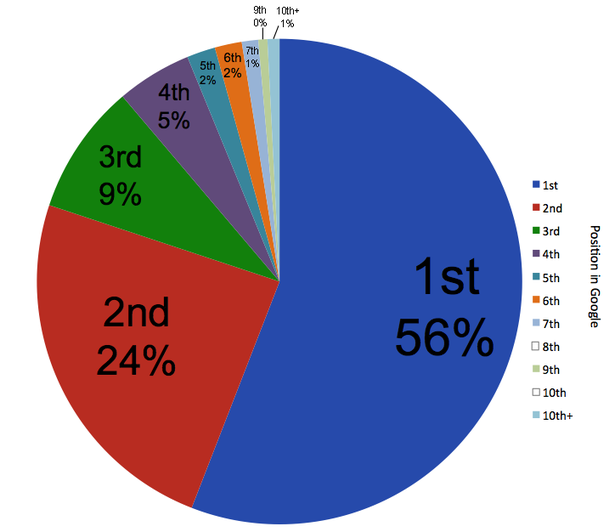
How has Wikipedia come to rank so highly in search results?
By producing high quality, authoritative content.
- Wikipedia is constantly being updated, receiving between 125,000 and 150,000 edits every single day.
- Wikipedia’s up-to-date information has made it the go-to sources for a wide variety of informational topics, which has the knock-on effect of making it look very friendly to search engines.
I’ve found that this goes for a variety of other highly influential sites too – if you’re seen by online communities as a voice of useful knowledge, you’ll be getting better links and more traffic from respected websites, and your SEO score will rise without any extra effort on your part.
How to Build Authority
So then, how do you increase your site’s authority?
Here are my top steps for increasing authority:
Step 1: Create high quality content
Step 2: Get it posted on other websites
Yes, guest blogging is my favorite way to bring in new traffic, build domain authority, and improve a website’s search engine optimization.
Guest posting:
- Brings in authoritative, relevant links to your site
- Attracts relevant leads
- Develops your site’s audience
These all help to show search engines that your site is an authoritative source on relevant subjects.
I’ve used guest posts on a variety of content marketing websites to help develop my own online authority, and it’s been a big help to establishing myself in marketing circles, as well as growing this site’s readership.
Robots Don’t Need Guest Blogs
It’s important to note that guest blogging purely for SEO purposes is not only frowned upon, but is generally considered useless from an SEO perspective.
The trick to making the most of your guest blogs is not two write spammy articles just for the sake of a link.
You want to write solid, authoritative articles that will appeal to readers and make them want to know more.
If your content stands out and makes things easier for human users, they’ll naturally want to share your resources with other people on the internet.
- This will, in turn, lead to a higher search engine ranking, as more trusted sites like Wikipedia start throwing your name around as a source of quality, helpful content.
- White papers are a great example of the meshing of site visitor interests and SEO. They’re searchable and can be optimized, and they give readers the information they need to make decisions.
- They also establish your brand as an authority on a particular subject, which means that Google is going to be more likely to display both the white paper and your site when users are searching for related topics.
No matter the type of content you produce, as long as it’s relevant, informative and engaging, it’ll naturally look very appealing to the search engines.
2. Create In-Depth Content
In the early days of the internet, the myth abounded that internet users didn’t actually read content.
This led to a trend among marketers to produce articles, blog posts and other copy that were as short as possible, for fear of losing the reader’s attention.
- Back in 2012, it was widely believed that posts of around 500-700 words were ideal for not overwhelming readers with too much content.
- Short posts, though, aren’t very helpful from an SEO perspective, and as far as content marketing goes, they’re not always the most effective at convincing readers to engage.
- The initial problem with short posts from an SEO perspective is that they don’t give Google enough to go on.
The average post length of the first article that appears on a Google search is around 2,500 words long, and the shorter an article is, the lower it’ll place on average in a Google search results page.
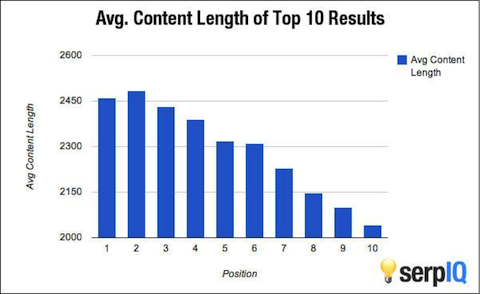
Longer posts benefit from more links, and enjoy a larger number of long tail keywords, helping you to make the most out of each article’s potential reach.
You can also make the most out of your posts by giving your images relevant names and providing video transcripts. These are:
- Helpful from a keyword search perspective
- Good etiquette to provide easier access for visually challenged site visitors.
Planning For Attention Spans
But what about losing readers’ attentions with longer posts?
Well, I’ve found that it all depends on the quality of the content.
- Users looking for in-depth information on a particular subject aren’t going to mind longer posts, as long as they provide a better understanding of the subject the user is trying to learn about.
According to content marketing group Medium, the optimal time an article should take to read is about seven minutes:

This is long enough for readers to get drawn into the content, but not so long that they lose interest.
While everyone reads at different speeds, aiming for articles that take around seven minutes to engage with can help make sure users get the most out of content.
This will generally mean articles of a few thousand words, and adopting good content marketing practices will lead to the creation of text that’s rich with keyword phrases, links and other elements that are music to a search engine’s ears.
The more your content is optimized to appeal to human users, the higher your site will appear in search results.
3. Create Shareable Content
There are loads of benefits to developing a strong social media presence:
- Social media can help you reach out regularly to followers, keeping your brand constantly at the front of their minds.
- Viral marketing through social media can help your content travel further than it would manage on its own, reaching new, larger audiences.
- Perhaps even more importantly, creating shareable content will naturally improve all the metrics that Google uses to determine a site’s worth.
Strength in Numbers
A lot of online marketers feel that there’s a strong link between social media engagement and its search engine ranking.
In a recent survey, the majority of SEO experts said that they considered engagement with content and URLs to be the top metric connecting social media and search engine rankings.
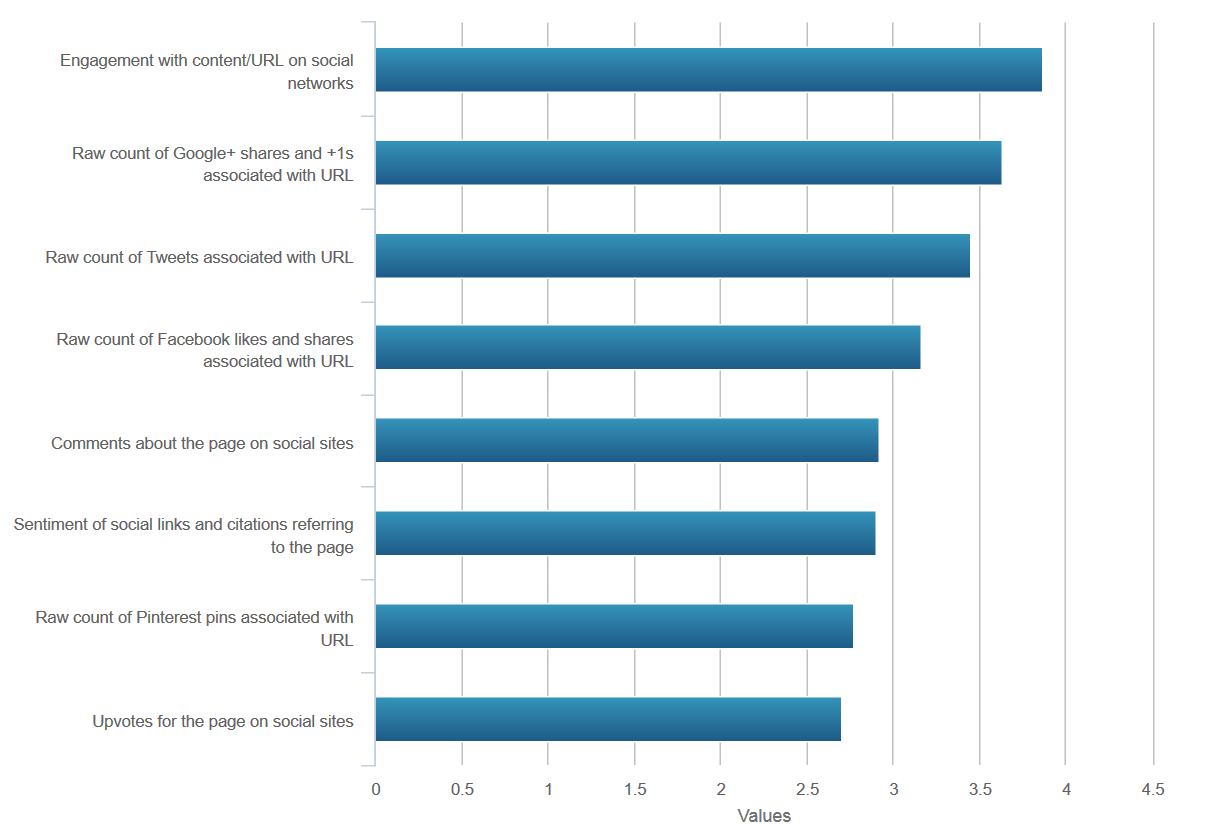
Personally, I don’t believe that high social media engagement makes a piece appear higher in a Google search:
- It’s difficult to separate correlation from causation when it comes to popular content with good SEO.
- That said, there’s definitely a link between creating quality content, its popularity on social media, and its appearance at the top of a search results page.
Be warned: black hat social media practices, such as buying fake likes or using fake profiles to promote content, are frowned upon by search engines and can actually harm your ranking.
The Secret Strategy to Social SEO Success
As with all other aspects of content marketing, there’s no sneaky trick to boosting your social media popularity or your search engine authority.
I believe that the magic formula is quality:
- Good, solid content will make social media users want to engage with and share your marketing materials.
- It will also convince Google that your website is exactly what their users are searching for.
Working your way through the traditional steps to improving your social media following – such as posting consistently and making sure to include plenty of images – will ensure your content travels as far as possible.
4. Boost Brand Awareness
Content marketing efforts – in particular, producing high quality content – can help to build your brand’s reputation, which can lead to an SEO boost.
Brand awareness and SEO produce something of a cycle of growth: the more reputable your brand is, the better it performs on search engines, which in turn leads to even more brand awareness.
This cycle is why established brands are able to ride on their existing notoriety, while smaller startups have to put more effort into clawing their way to the top of a Google search.
The Coke Effect

The thing about big brands online is, they don’t often need to work very hard for search engine success.
The Coca-Cola company is one of the best examples of brand awareness – the work ‘Coke’ is actually copyrighted by the company, meaning that when people search for, say, ‘Coke recipes’ on Google, the Coca-Cola company are both the first and second hits.
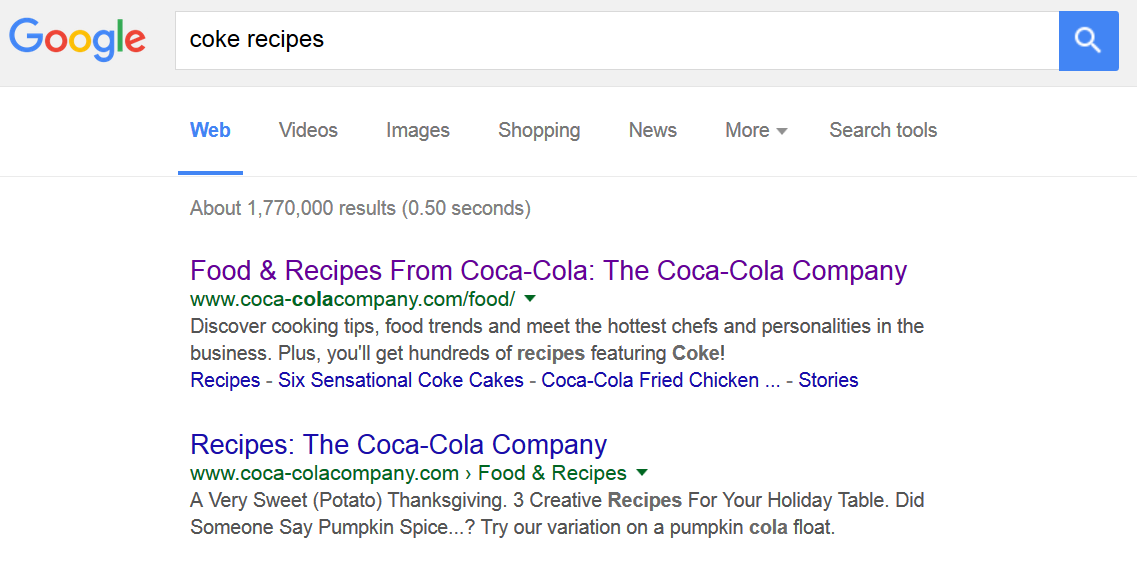
Coke is their word. They own it so completely that any reference to a cola drink is a reference to a brand, and Google knows this.
What happens is you search for ‘cola recipes’ instead?
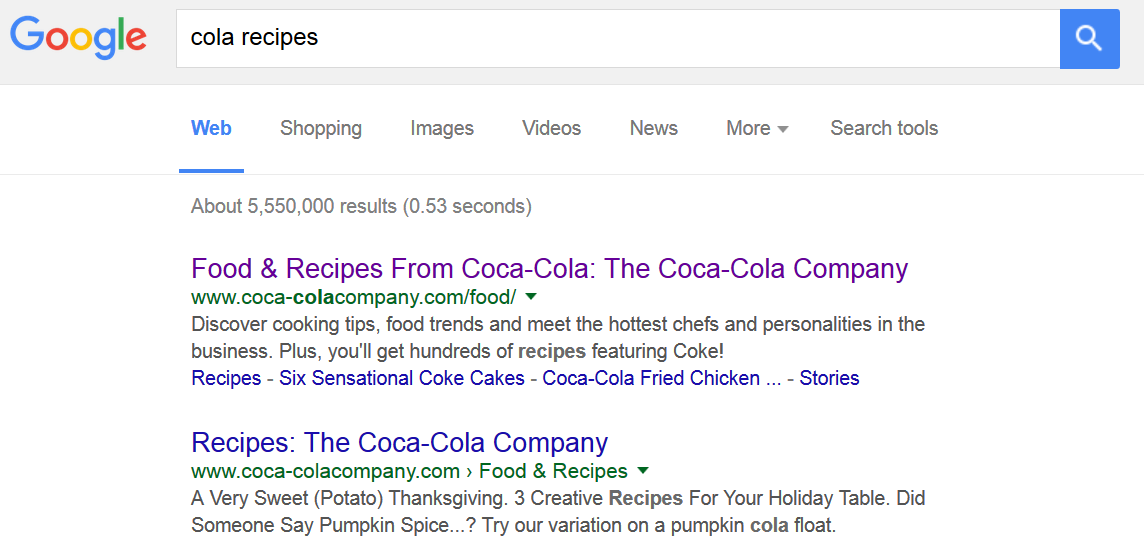
Google gives the exact same first two hits.
Coca-Cola’s branding is so strongly associated with its product that even generic searches take users directly to its content.
Building Your Brand
In building your brand awareness, you want customers to begin associating your name with the products that you sell and the content you produce.
- Just as Coca-Cola is synonymous with coke and cola, you want people to start instantly thinking of your name when they think of services like yours.
- Creating infographics, videos and other branded content that features your name means that people will start thinking of your brand when they think of quality content, and that’ll affect their searches.
People who want to see a video you produced about blenders (as was the case with Blendtec’s ‘Will It Blend’ video campaign), will search for your brand name along with the words ‘blenders’.

Google will begin to associate your brand with blenders, and will start assuming that when other people search for blenders, they’re looking for your website.
5. Create Quality Content Consistently
In my personal experience, there are two elements that a successful content marketing campaign absolutely must contain.
- The first is quality content.
- The second is consistent content.
Regularly produced content of a consistently high quality is the aim of every online content marketing campaign.
It’s not one that many marketers achieve, though. According to the Content Marketing Institute, 57% of marketers consider producing consistent work is one of the top five challenges to B2B marketing.
Another survey has shown that 70% of marketers lack a consistent marketing strategy.
Tough, But Worth It
It’s incredibly difficult to produce content that’s of a high quality on a regular basis. Good content takes time, and producing it with enough speed to maintain a frequent publishing schedule isn’t always easy.
Consistency is definitely worth it, though: it’s considered by many marketers to be the number one most important factor in improving SEO rankings for content.
Consistent work shows Google and other search engines that your site isn’t just a one-off hit – it’s a fresh, constantly relevant source of important information that their users can trust to deliver relevant and up-to-date information.

What’s more, posting consistent content means more hits for your site, more engagement both through search engines and social media, and greater opportunities to build brand awareness.
Producing high quality content on a frequent, consistent schedule helps all other aspects of content marketing develop, and gives your brand a big boost on search engine rankings.
It also gives you a leg up on your competition, because if you’re finding it difficult to produce regular content, there’s a good chance your competitors are struggling too.
How to Create Consistent High Quality Content
Sadly, as with all elements of content marketing, there’s no magic formula that can instantly help you to improve the speed with which you can release content.
The best advice that marketers can offer is to develop self-control and focus within your content marketing efforts through ensuring that you hit self-imposed milestones.
Make a regular content schedule, and stick to it.
As different types of content need to be published more or less frequently, it may help to develop a content marketing calendar which helps you keep track of when different pieces of content are due.
Social media content should be a daily occurrence, while blog posts should be scheduled on a weekly calendar, and larger pieces of content should go out monthly or even annually depending on how long they take to develop.
I’ve found that the key is making sure that Google regularly sees new content appearing on your site – it shows that your brand is living and breathing.
Welcome to the Future
There’s not really a line between where content marketing ends and where SEO marketing begins.
While it’s possible to focus entirely on optimizing your website for search engines and to ignore the actual content on your site, Google is deliberately rooting out blackhat attempts to game search engine results.
Instead, the best way to rank highly on Google is to prove that your site is worth its while. High quality content helps to let Google know that your site is special, and deserves to appear at the top of the results page.
- In fact, marketers predict that Google’s reliance on the perceived value of a site is likely to grow 81% in 2016, and that it’ll be the second fastest growing factor in search engine relevance, after mobile friendliness.
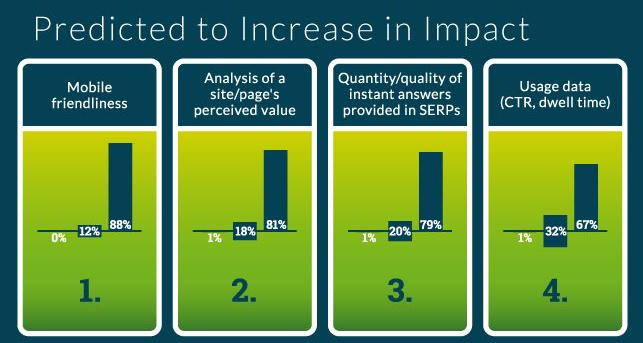
Making your website content appeal to humans is going to increasingly be the best way to raise your site’s profile.
After all, unless you sell oil cans or electric sheep, marketing is about convincing people, not robots, to fall in love your brand.
What steps are you taking to deliver regular high quality content that’s optimized for SEO best practices? Share your best tips by leaving a comment below:
Images: Google, Econsultancy, Flickr, Econsultancy, SerpIQ, Medium, Moz, Flickr, Google, Google, Flickr, Moz
]]>



